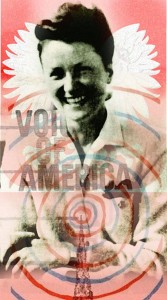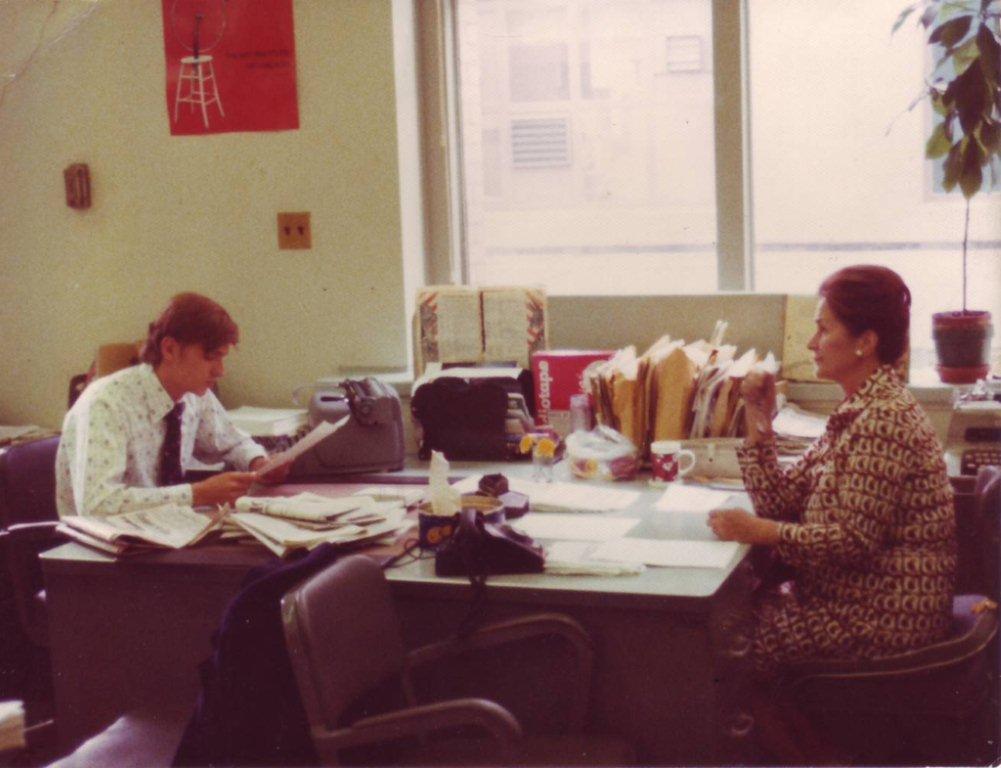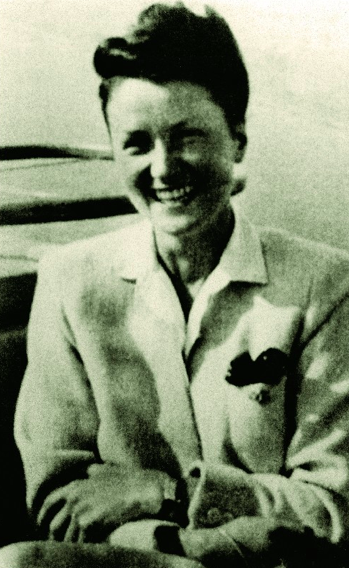Commentary
A Fearless Woman Journalist Should Replace First Director As VOA’s Key Historic Figure
By Ted Lipien

With U.S. taxpayer-funded Voice of America (VOA) undergoing what may be its biggest crisis since its beginning 75 years ago in 1942, on this International Women’s Day I would like to propose that VOA reverse its current descent into unprecedented depths of partisanship and sloppy journalism by recognizing one of its forgotten female journalists, Zofia Korbońska .
VOA would do well by re-examining its early, as well as its most recent history, and draw appropriate lessons for the future. I would like to suggest that as part of this process, VOA officials and historians should replace VOA’s first director, Hollywood actor John Houseman, as their key historic figure with VOA’s Polish Service most famous female journalist, the late Zofia Korbońska, a hero of anti-Nazi and anti-Communist resistance.
Zofia Korbońska was almost everything that John Houseman was not. They were both refugees from Europe who came to the United States and were both opposed to Fascism. That’s were most similarities end. She fought the Nazis in Poland while he escaped to the West. He was strongly pro-Soviet and pro-Stalin and a believer in transformation of Soviet communism into a socialist democracy. She was anti-Soviet, anti-Stalin, and anti-communist, and a former prisoner of the Soviet NKVD secret police. He was above all an actor, an ideologue, a propagandist and a believer in psychological warfare. She was a real journalist, as well as a real soldier of the anti-Nazi Polish resistance. He tried to influence and sometimes deceive the audience with communist propaganda. She exposed and countered communist propaganda any way she could. He practiced censorship to protect Stalin. She opposed censorship. He defended and protected pro-Soviet journalists working for him at that time at the Voice of America, she was one of many journalists hired by VOA after the war to replace them. He lashed back at his East European critics with ethnic slurs even many years after the war. She was one of those many ethnic anti-communist journalists he intensely disliked. At least two of Houseman’s key foreign language WWII VOA broadcasters went back to Eastern Europe to produce anti-American propaganda for Soviet-dominated communist regimes in Poland and Czechoslovakia after the war. Zofia Korbońska and her husband Stefan Korboński, a WWII anti-Nazi resistance leader war hero and member of Poland’s parliament, escaped from Poland to the West in 1947. They were both my friends. She was my mentor and coworker at the Voice of America for many years. In 2006 she was given the title of honorary citizen of the Capital City of Warsaw. President of Poland Lech Kaczyński awarded her the Grand Cross of the Order of Polonia Restituta.
Zofia Korbońska worked as a reporter and fought in the 1944 Warsaw Uprising. As another Polish journalist recalled in 1953:
“With genuine horror we listened to what the Polish language programs of the Voice of America (or whatever name they had then), in which in line with what [the Soviet news agency] TASS was communicating, the Warsaw Uprising was being completely ignored.”
Ambassador to the United States of the Polish Government-in-Exile during World War II Jan Ciechanowski wrote in his book Defeat in Victory published in 1947:
“I explained to those responsible for it [Voice of America radio broadcasts] in the OWI [U.S. Government mega propaganda agency during the war which included VOA] that the Polish nation, suffering untold oppression from Hitler’s hordes, was thirsting for plain news about America and especially about her war effort, her postwar plans, and her moral leadership, that Soviet propaganda was being continuously broadcast anyway to Poland directly from Moscow, and there seemed no reason additionally to broadcast it from the United States.”
Even after John Houseman’s departure from VOA in 1943, other pro-Soviet VOA journalists continued to push the Soviet line. They did not leave until the end of World War II or shortly thereafter.
As the first Voice of America director, Houseman had initiated the manipulation of news in WWII VOA radio broadcasts, and referred to them as an “instrument of propaganda” and “psychological warfare,”[ref]Houseman, John. Unfinished Business Memoirs: 1902-1988. New York, NY: Applause Theatre Books, 1989.[/ref] which they were under him and OWI [Office of War Information] director Elmer Davis. Houseman was too pro-Soviet even for the Roosevelt White House and the U.S. State Department. They did not object to coordination of American and Soviet propaganda when the Voice of America covered up Stalin’s crimes under Houseman, but when he and his colleagues pushed the Soviet line too far by opposing U.S. attempts to draw Italy out of the war by striking a deal with its formerly pro-German government, the State Department refused to give him a U.S. passport and he was forced to resign in 1943.
This early VOA history is little known and John Houseman is still being wrongly presented as a champion of journalistic integrity. [ref]Nordlinger, Jay. “A Voice of America, Part I.” National Review, April 19, 2016. Accessed October 3, 2016. http://www.nationalreview.com/article/434211/voa-remarkable-chief-its-ukrainian-service-myroslava-gongadze-part-i.[/ref]
Another candidate for replacing John Houseman as an iconic figure of the early Voice of America would be a Jewish refugee from Austria, Julius Epstein, a courageous journalist who opposed Soviet propaganda at VOA and was pushed out by the pro-Soviet management at the end of the war. Later, VOA officials tried to undermine his reputation by bringing up his immigrant status and disclosing that as a young university student he was briefly a member of the Communist Party and a communist students’ group in Germany.
For many years after the war, Julius Epstein was active in mostly successful bipartisan attempts to reform the Voice of America, where Zofia Korbońska was still working, and supported efforts to create Radio Free Europe and Radio Liberty. In light of the current crisis at VOA and its parent agency, the Broadcasting Board of Governors (BBG), real journalists like Zofia Korbonska and Julius Epstein and the same kind of actions to move VOA away from partisan journalism to fulfilling its traditional mission of serving the most oppressed audiences overseas are needed now more than ever.
Partisanship was an alien concept to her and most of us who worked at the Voice of America in the 1970s and 1980s. I do not even know whether she was a registered Democrat, a Republican or an Independent. She was equally critical of Democratic and Republican presidents when they said foolish things about the Soviet Union. She did not suffer fools gladly. I know that she admired both John F. Kennedy and Ronald Reagan for their principles, their strong support for freedom and their opposition to Soviet oppression of what we called then “the captive nations.” Her friend, former National Security Advisor to President Carter, Dr. Zbigniew Brzezinski, delivered in Polish a beautiful eulogy at her funeral.
On this International Women’s Day I’d like to pay tribute to Zofia Korbońska (even though she would probably object to honoring originally a communist holiday) by reposting a portion of my Washington Times op-ed written shortly after her death in Washington in 2010 at the age of 95. Czesc Jej Pamieci.
LIPIEN: Remembering a Polish-American patriot | By Ted Lipien, THE WASHINGTON TIMES, September 1, 2010
Zofia Korbonska was underground resister, VOA journalist
As a member of the Polish Undergroud Army, Armia Krajowa (AK), during the Nazi occupation, Mrs. Korbonska daily risked her life writing and coding secret shortwave radio transmissions sent from Poland to the Polish government in exile in London. Her dispatches kept the outside world informed about Nazi atrocities and anti-German resistance. Thanks to her, some of the first news about the killings by the Gestapo of members of the Polish intelligentsia, the Nazi extermination of the Polish Jews and the medical experiments on women prisoners at the Ravensbruck concentration camp reached the Free World and were broadcast back to occupied Europe by the BBC.
READ MORE: Remembering a Polish-American patriot

Disclosure: Ted Lipien is a BBG Watch co-founder and one of its supporters.
